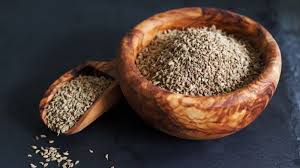Ajwain also known as carom seeds, is a spice that is frequently used in Indian cooking and traditional medicines. It is derived from the fruits of the Ajwain plant (Trachyspermum Ammi), which is grown throughout Asia and is endemic to the eastern Mediterranean region. The tiny, oval-shaped seeds of ajwain have a very strong flavour and scent. Ajwain seeds are also well-known for their antibacterial and anti-inflammatory properties, which makes them a popular component in natural remedies for various health issues, such as respiratory disorders, menstrual cramps, and gum problems and bad breath. Apart from this, there are some anecdotal evidences that suggest that ajwain may have benefits on reproductive.
Let us look at ajwain’s potential impact on reproductive health:
- Antioxidant Characteristics: Ajwain contains substances with antioxidant characteristics, such as thymol. By assisting the body in combating dangerous free radicals, antioxidants help lower oxidative stress. Elevated oxidative stress can harm all cells, including egg and sperm cells, which may have an impact on fertility. Ajwain may help shield reproductive cells from harm and promote reproductive health by lowering oxidative stress.
- Menstrual Control: Ajwain is occasionally used in traditional medicine to regulate menstrual cramps and menstrual cycles. Since they show that the reproductive system is operating normally, regular menstrual periods are important for fertility. Menstrual abnormalities or irregular cycles might be signs of underlying hormonal imbalances or problems with reproduction that can impact fertility. Since it promotes hormonal balance and reproductive health, ajwain’s ability to control menstrual cycles may indirectly improve reproduction.
- Aphrodisiac Properties: Although there is not much scientific proof to back up this belief, certain cultures hold that ajwain has aphrodisiac qualities. Substances known to boost libido or sexual desire are called aphrodisiacs. Fertility can be positively impacted by increased libido and sexual function since these traits increase sexual activity and increase the chance of conception.
- Digestive Health: For centuries, ajwain has been used to treat digestive problems like gas, indigestion, and bloating. For overall health, including reproductive health, gut health is essential. The appropriate absorption of nutrients required for reproductive activities is ensured when the digestive system is operating at peak efficiency. The body’s capacity to create hormones, preserve hormonal balance, and sustain reproductive organs is supported by adequate food absorption.
- Effects on Inflammation: Ajwain has anti-inflammatory qualities that may help in lowering inflammation in the reproductive system. Reproductive health problems can be aggravated by inflammation of the reproductive organs, which can also prevent them from working properly. Ajwain may promote general reproductive health and enhance fertility results by lowering inflammation.
- Hormonal Balance: The health of the reproductive system depends on hormonal balance. Hormonal imbalances affecting ovulation, sperm production, and fertility can include oestrogen, progesterone, testosterone, and others. There is little scientific evidence to support the notion that ajwain can assist balance hormones, despite suggestions made by certain traditional medical systems. To precisely understand how ajwain may affect hormone balance and reproductive health, more research is required.
Although ajwain may have positive effects on reproductive health, it is important to note additional study is necessary to confirm its benefits. Furthermore, each person’s body will react differently to ajwain, so before using it necessary to consult a doctor.











